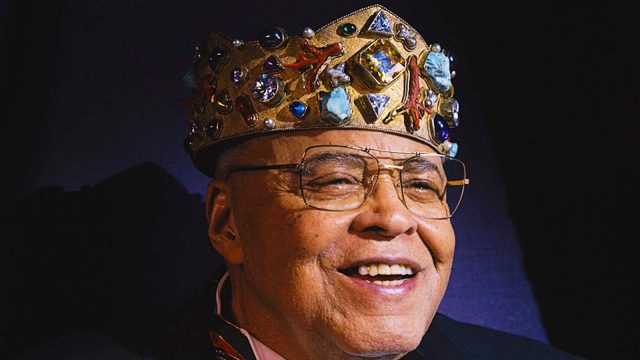Heavy Lies the Head that Bears:
- an acting legend
- a new movie pan
- a Repo Man alternative
- a Super award
- child acting!
Bend the knee for Miller and his vanquishing contributions today. Send articles throughout the next week to ploughmanplods [at] gmail, post articles from the past week below for discussion, and Have a Happy Friday!
K. Austin Collins remembers James Earl Jones at The Atlantic:
It can be hard to remember that he was more than a voice. Last night, I revisited the 1974 film Claudine, which stands out, among Jones’s screen roles, for its reminder that he was not simply a noble patriarch, a la The Sandlot and Field of Dreams, or trusted authority figure, as in his short stint as a detective on TV’s Paris. For a time, Jones seemed to flirt with becoming a sex symbol, playing a role that feels extraordinary now given his image. In Claudine, he starred as Rupert “Roop” Marshall, a sexy garbage man whom Diahann Carroll, in the titular role as a working mother with six kids barely getting by, can’t help but fall for. This is somewhat to her detriment, but also very much to her pleasure, which the film noticeably lingers on: long scenes of Claudine and Roop in bed, smoking after sex, talking during sex, so much of their lives playing out in the tight confines of his Harlem bedroom, an escape from the even tighter digs of Claudine’s crowded, noisy apartment. Jones seduces us just as he seduces her, with that glint of mischief in his eye, that hop-and-skip excitement coursing through his body, a sexual rowdiness and candor that—to make a claim that is made too often nowadays but is actually true in this case—is rarely seen in romantic comedies today.
For Little White Lies, Mark Asch takes a skeptical look at Joshua Oppenheimer’s latest film, The End:
The film opens with an epigraph from T.S. Eliot’s Four Quartets, and its end credits identify the characters as “Mother,” “Father,” “Son,” and so forth, all of which is to say that Joshua Oppenheimer is a former recipient of a MacArthur “genius” grant. He wrote the lyrics to the songs, giving his cast of nonsingers wordy soliloquies to navigate with their largely plangent, dry and reedy voices. …In a musical, music is used to give the characters a way to express what they mean to say when the scene and the dialogue is not enough; but the film’s dramatic and philosophical framework is so schematic, its dialogue so italicized with subtext, that the songs feel superfluous as well as prosaic.
For WBUR, Sean Burns reviews a new theatrical retrospective of the 1994 “if Repo Man was in the 90s and in New York and massively queer” movie Fresh Kill:
This new print is the key component of [director Shu Lea] Cheang’s tour, the filmmaker insisting in the press notes that ‘all screenings will embrace vintage 35mm projectors — a subtle if not poetic questioning of our surrendering our fates to overlording algorithms and the dictatorship of the digital.’ …Despite being made back in the days when everyone still used AOL, “Fresh Kill” feels more engaged with online life than movies conceived decades later. Characters find themselves constantly interrupted by nonsense memes like “BOYCOTT TOILET PAPER” (“What brand?” wonders the sushi chef) and the plot progresses like you’ve got multiple tabs open at once.
What’s cooler than winning an Emmy? Winning a Super Emmy. From Brian Lowrey at The New York Times on the real (and real disastrous) award and why it might be interesting to bring it back:
But a Super Emmy would do more than merely add a “Highlander”-style bolt of excitement — “There can be only one!” — to a generally predictable telecast. It would also acknowledge the blurring of lines in TV’s categorical designations, which often makes it hard to differentiate between drama, comedy and limited series. In recent years, the comedy category in particular has been loosely defined, with contenders that fulfill the academy’s mandate of honoring excellence without much resembling traditional players like the “The Mary Tyler Moore Show.” (Moore claimed her Super Emmy win by topping Michael Learned of the family drama “The Waltons.”) Take “The Bear,” the reigning top Emmy comedy and an odds-on favorite to retain that crown. Even the most fervent admirers of the FX series about a Chicago chef and his eccentric collaborators would likely concede that the kitchen doesn’t serve up many laugh-out-loud moments. “Barry,” HBO’s fitfully brutal series about a hit man turned actor, also provoked its share of head scratching on the comedy ballot.
And at The Toronto Star, Adam Nayman looks at the breakthrough, heartbreaking performance of his two-year-old daughter in a new movie:
Avery […] didn’t have to do much more to pressurize her scenes than go about her usual business of wandering, playing and having the occasional post-nap meltdown. Jean-Luc Godard once observed that every fictional film is a documentary of its actors, and it’s true. Every time I looked at the monitor to see Avery’s onscreen parents (including her frustratingly handsome stand-in dad, Mounir al Shami) trying to speak to each other in full sentences while mollifying the moody young ingenue with crunchy snacks and YouTube clips of “Baby Shark,” it felt uncannily like cinéma vérité.


